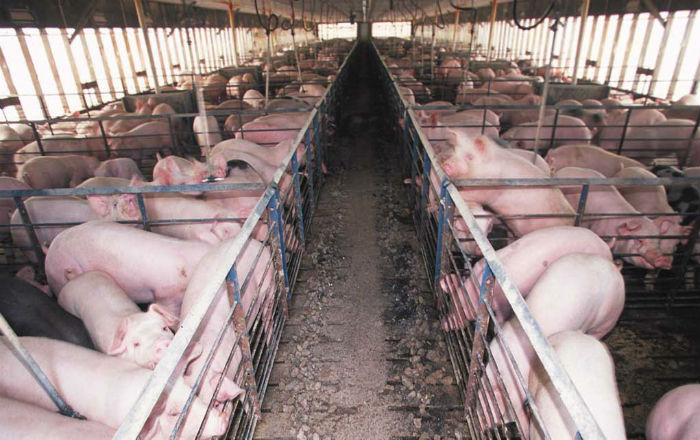Letter to the Editor: Utah’s ag-gag law and when activists exploit the 1st Amendment

I am writing this letter in response to Paul Dail’s opinion piece, “Utah’s ag-gag law and when cash chokes the Constitution.” I’m speaking as someone who has spent almost forty years in the agriculture field but also as the father the author mentions in the first few paragraphs. I am proud to have raised sons who think for themselves and are willing to consider divergent opinions, but as I have told them, they have to be willing to defend those opinions.
Along these lines, Proverbs 12:10 states, “The righteous one cares for his beast.” For the not-so-religious, there’s a philosophy stating that the main thing separating us from the lower animals is our ability to feel empathy.
A funny thing happened on my way to dental school. I realized that I had too much cow in me to spend my life in scrubs, peering into people’s mouths. My love for working with animals, coupled with an opportunity to provide food, fiber and essential byproducts to others, led me to a career as an animal scientist. A graduate degree (animal breeding) that included work in a reproductive physiology lab literally put me at a different end of my clients than a dental career would have.
And so it goes, I traded a future Porsche for a pickup. Teaching college animal science, raising and marketing livestock, consulting and/or living in a dozen states throughout all quarters of the country have given me an opportunity to gain a broad perspective of agriculture and the people for whom it is a way of life. Those who have chosen a life working with animals abhor animal cruelty if for no other reason than it’s poor economics, to say nothing of immoral. Frightened, mishandled farm animals often become poor producers, affect the behavior of other animals around them, and become dangerous to people working with them.
Does that mean the industry is free of animal abuse? Of course not. Does it mean that out-of-control situations involving animals weighing upwards of 2000 pounds (we call them wrecks) never occur where fast, aggressive intervention is necessary? Nope. Does it mean that even the best handlers don’t occasionally have their moments? That would be another no. The problem arises, however, when special interest groups vowed to destroy an industry lie in wait to capture a moment, distort it to their own ends, then subsequently hide behind the First Amendment.
This exploitation of the First Amendment is reckless and should raise the ire of responsible journalists. Today, a young man in Saudi Arabia is in jail having received the first 50 of 1000 lashes and a ten year sentence for the secular nature of his blog and writings. But really, he’s being punished because he lives in a country with no First Amendment rights. His “offenses” wouldn’t even be newsworthy in America…unless, of course, he was promoting some form of radical violent acts against “we the people.” Then he gets added to someone’s list at the least.
So, what happens when the aforementioned special interests are linked to lawlessness and feel justified destroying another’s property in the name of their cause? It is then that legislation such as agriculture protection legislation (HB 187) is enacted out of fear that activism will get stirred into terrorism. I make no claim to be a constitutional scholar but, if the amendments were above reproach and absolutely clear, there would be no need for such expertise. I am one who thinks the framers were great men, but I don’t necessarily believe they had prophetic insight into the future.
Because no one can measure the intent or scope of the amendments, both sides claim ownership when it serves their needs. Proponents of HB 187 claim the First Amendment is being misused to camouflage an extremist agenda; opponents claim their First Amendment rights are being violated. Without defending or condemning HB 187, I am not as confident as my son that it will go down easily. First, there is a Supreme Court precedent where speech is unprotected if it is known to provoke a violent reaction. Also, the Tenth Amendment (states rights) may also be used to defend legislation like HB 187.
Back to what I know a little more about. My son used my quote about not criticizing agriculture with you mouth full. Another favorite saying in the field is “agriculture is the one culture that makes all other cultures possible.” We in agriculture have always believed we’re doing good work in the service of others, never suspecting that we would come under scrutiny or attack by activists or special interest groups. Initially the agricultural industries were caught off guard and unprepared.
Initially, agriculture failed to tell its story during a time when the rural populations were migrating to the cities and suburbs and activist groups were filling their coffers. Coincident with this migration, the American ranchers and farmers are being asked to feed more and more people. Most recent reports are that the average agricultural producer feeds his own family and 155 others worldwide. In 1960, that number was under 26.
We all like the vision of the happy pastoral farm with animals grazing clover and an abundant cornucopia of organic produce. Unfortunately, this isn’t reality for feeding the population. The economies of scale dictate that the majority of food animals will at some point be concentrated. Fortunate are those who can buy locally and choose the manner in which their food is produced or produce some of it themselves. However, the vast majority of the population living in urban or suburban settings depend upon production agriculture to provide a healthy, nutritious product at an affordable price. They have no idea what it takes to produce these products or how completely dependent they are on having them be affordable.
One commenter on my son’s article mentioned “speciesism,” which has little to add to the discussion in my opinion, except to acknowledge that whether by evolution or divine intervention, humankind has ended up with dominion over the “lower” animals. Speciesism goes on to imply that dominion over other species automatically leads to abuse. Not so. I believe I am far from being alone in thinking that along with primacy is the responsibility to care for those animals to the greatest extent possible while, at the same time, paying homage to their contribution to human welfare.
So where do we go from here? Should this industry charged with feeding, clothing and providing byproducts to others be allowed to run amok, not being held accountable to anyone? Oh, wait– there’s the FDA, USDA, and dozens of federal sub-agencies and professional societies not to mention state and local authorities that have some level of responsibility for protecting animals and consumers. So the question is not whether agricultural enterprises should be scrutinized and accountable. The question is by whom? Organizations who are out to destroy one’s livelihood and contribution to society would not be a top choice for whom agriculture should be accountable. That’s tantamount to inviting the fox into the hen house (pun intended).
Sincerely,
Dan Dail
Sunday Edition content for January 25, 2015

LOCAL WORSHIP GUIDE: Spiritual and religious gatherings in Southern Utah
Our Best of the Week
POLL: Do you think restaurants should be required to pay minimum wage to employees even if they work for tips?
Living a Life with Purpose: Wearing dresses & gender roles
Senior Connection Show coming tomorrow, Jan. 26 to St. George
Cease fire declared between Upper Limit Aviation and Cedar City Council
Healthy Recipe of the Week: Deep Dish Tortilla Pie
CARTOON: ‘Deflated’ by Clay Jones
OPINION: The outdoor industry should be a force to be reckoned with in Utah
Exploring Southern Utah: Gold Strike Canyon
Letter to the Editor: Utah’s ag-gag law and when special interests exploit the 1st Amendment
The Independent welcomes cartoonist Travis Romney and So. Utah Comic Series




